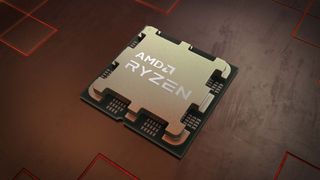AMD’s Strix Point APU could be another nail in the coffin of standalone GPUs
Beefy integrated graphics clocked at 3GHz, apparently

AMD’s ‘Strix Point’ APUs are generating a good deal of excitement, and we’ve just had a further leak on these incoming chips that are supposedly due to land next year.
As detailed by YouTube leaker RedGamingTech, the theory is that Strix Point will see a potent combination of Zen 5 processor cores (AMD’s next-gen tech, which is likely to be incarnated as Ryzen 8000) plus RDNA 3+ integrated graphics. According to the rumor mill, the APU will mix big and little cores along the same lines as Intel’s hybrid tech (the model of performance and efficiency cores adopted since Alder Lake).
RedGamingTech’s sources are now claiming that the top-end Strix Point APU will run with 16 cores. 8 of those will apparently be big cores, meaning Zen 5 cores focused on performance, alongside 8 small cores, the latter supposedly being Zen 4D cores (essentially stripped-back Zen 4, the current-gen architecture, with a focus on much lower power consumption).
A further prediction is 32MB of L3 cache, but remember to be heavy on the seasoning with all these assertions – it’s still relatively early days for Strix Point, which as mentioned is set to debut in 2024.
As for the integrated GPU – a critical part of an APU which seeks to serve as an all-in-one replacement for a CPU plus discrete GPU combo – RedGamingTech believes this will have 8 WGPs (WorkGroup Processors) and run with a clock speed of over 3GHz, no less (on the flagship model). This will apparently be on an RDNA 3+ (refresh) architecture, offering some considerable grunt for integrated graphics if true.
The low-end APU for Strix Point will seemingly have a dual-core configuration for big cores and four little cores, with a middle model sporting four big cores and eight little ones.
It’s been the theory advanced for a while now that AMD is going to use TSMC 3nm and 4nm for next-gen chips, and we’re told that with these APUs, the top dog model will be built on 3nm, and lower-end variants will use 4nm.
Get daily insight, inspiration and deals in your inbox
Get the hottest deals available in your inbox plus news, reviews, opinion, analysis and more from the TechRadar team.
Analysis: Exciting times for integrated graphics
The more we hear about next year’s chips in the pipeline from AMD, the more it seems like they could usher in a new world for the integrated GPU. Judging from this leak, a refreshed take on RDNA 3 for integrated graphics – with clocks running at 3GHz perhaps – could be quite something.
Heck, we’ve recently seen the inbound Radeon 780M integrated GPU look very impressive in performance leaks (in an AMD ‘Phoenix’ APU inside a Chinese prototype notebook), and that’s based on RDNA 2 – let alone a refresh of current-gen RDNA 3. (Although it could just be plain RDNA 3, mind, as previous spinning from the rumor mill has cast doubt over the reality of whether RDNA 3+ is still happening – time will tell).
Whatever the case, it looks like Strix Point could offer a hugely tempting prospect for gamers on more of a budget who want to pick up a relatively affordable APU that represents a genuine alternative to a CPU plus mid-to-lower-end GPU combo.
Note that integrated graphics are never going to compete with higher-end standalone graphics cards, of course. However, it seems like they’re going to measure up nicely to the kind of mainstream cheaper GPUs that we see are the most popular looking at sources such as Steam’s hardware survey (where even cards like the lowly GTX 1060 still remain popular).
Darren is a freelancer writing news and features for TechRadar (and occasionally T3) across a broad range of computing topics including CPUs, GPUs, various other hardware, VPNs, antivirus and more. He has written about tech for the best part of three decades, and writes books in his spare time (his debut novel - 'I Know What You Did Last Supper' - was published by Hachette UK in 2013).
Most Popular



